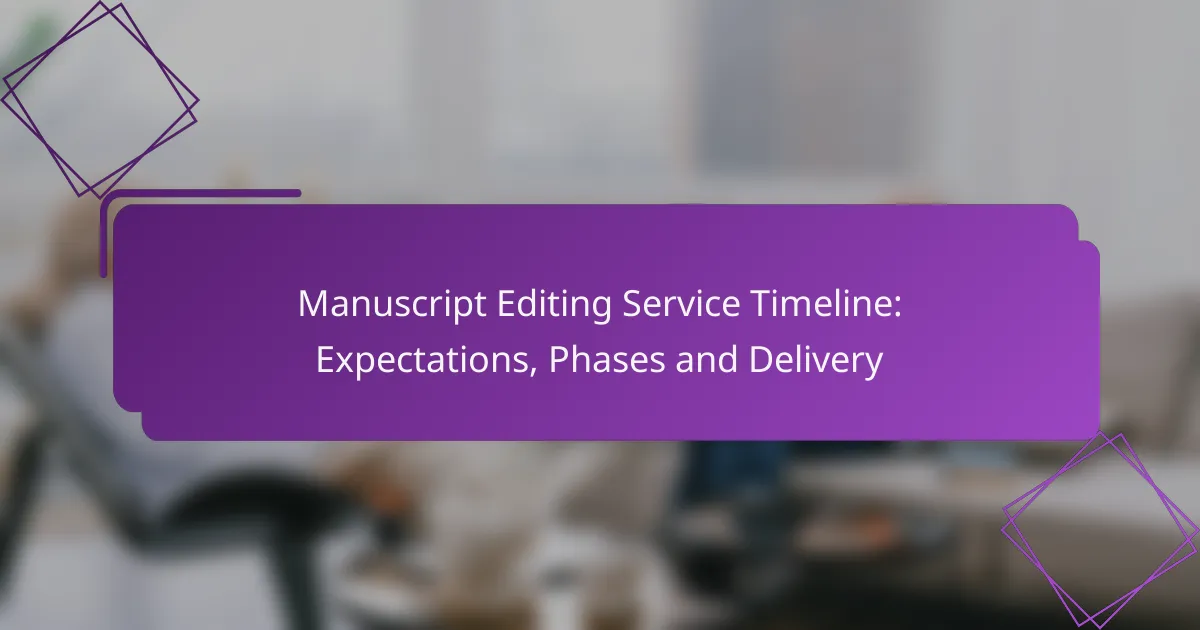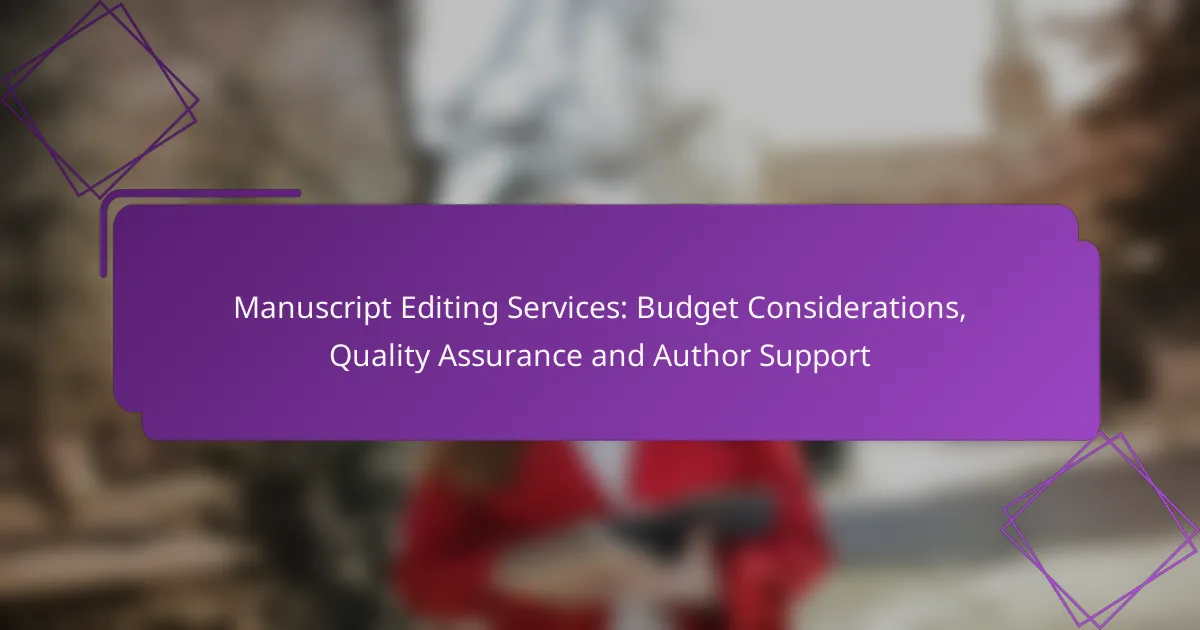Manuscript editing services play a crucial role in helping authors elevate their writing by providing specialized expertise tailored to various genres and formats. By focusing on clarity, coherence, and adherence to industry standards, these services ensure that manuscripts are polished and engaging for readers. When choosing an editor, it’s essential to consider their specialization and experience to find the perfect match for your unique project.

What are the best manuscript editing services in the US?
The best manuscript editing services in the US cater to various needs, including professional, academic, and genre-specific editing. These services help authors refine their work, ensuring clarity, coherence, and adherence to industry standards.
Reedsy for professional editing
Reedsy is a platform that connects authors with experienced editors who specialize in various genres. Authors can browse editor profiles, read reviews, and request quotes, making it easy to find a suitable match for their manuscript.
When using Reedsy, consider the editor’s experience in your specific genre and their feedback from previous clients. Rates typically range from $30 to $100 per hour, depending on the editor’s expertise and the complexity of the manuscript.
Editage for academic manuscripts
Editage specializes in editing academic manuscripts, offering services tailored for researchers and scholars. Their editors are familiar with academic standards and can help improve the clarity and structure of research papers, theses, and dissertations.
For authors in academia, it’s crucial to choose an editor who understands the specific requirements of your field. Editage provides a range of services, including language editing and formatting according to various style guides, with prices generally starting around $0.05 per word.
Fiction Editing for genre-specific focus
Fiction editing services focus on enhancing narrative elements, character development, and dialogue, tailored to specific genres like romance, science fiction, or mystery. Editors in this field understand genre conventions and can provide targeted feedback to strengthen the manuscript.
When selecting a fiction editor, consider their familiarity with your genre and their approach to storytelling. Many editors offer sample edits to showcase their style, which can help you make an informed decision. Rates for fiction editing can vary widely, often ranging from $0.01 to $0.05 per word, depending on the editor’s experience and the manuscript’s needs.
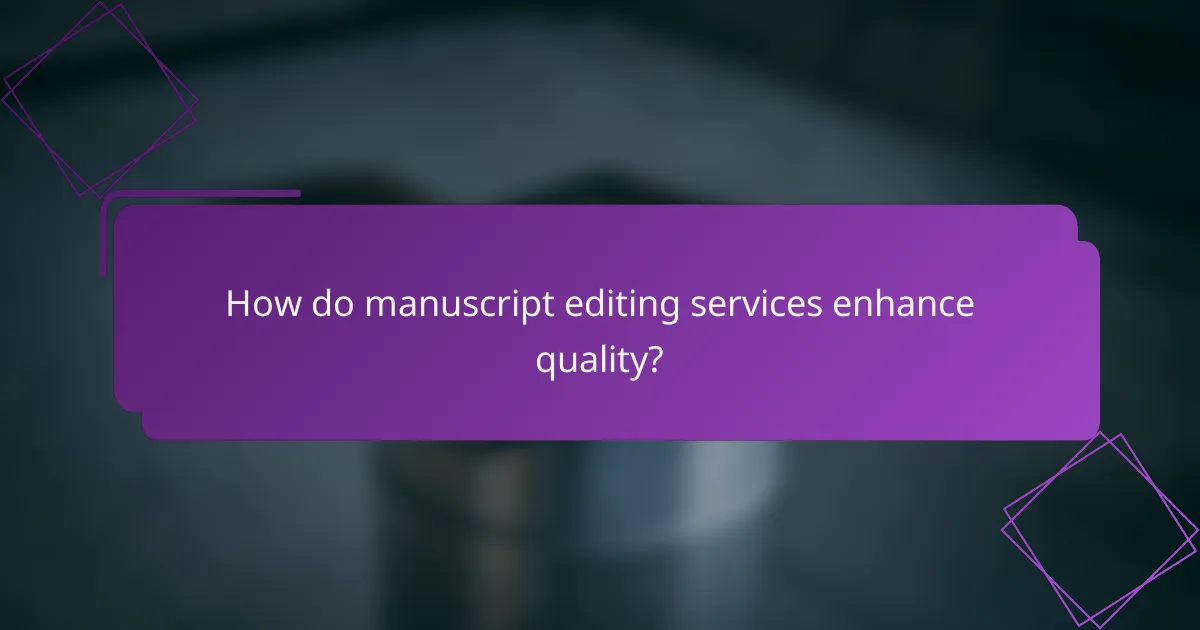
How do manuscript editing services enhance quality?
Manuscript editing services significantly enhance quality by refining language, structure, and overall presentation. These services help authors produce polished works that are more likely to engage readers and meet publication standards.
Improved clarity and coherence
Editing services focus on enhancing clarity and coherence, ensuring that the manuscript communicates ideas effectively. Editors identify ambiguous phrases and restructure sentences to improve readability, which is crucial for maintaining reader interest.
For instance, a convoluted sentence may be simplified to convey the same message more directly. This process often involves breaking long sentences into shorter ones and using straightforward vocabulary.
Grammar and punctuation correction
Correct grammar and punctuation are essential for professional writing. Editing services meticulously check for common errors such as subject-verb agreement, verb tense consistency, and proper punctuation use.
Authors should be aware that even minor mistakes can distract readers and undermine credibility. A thorough review can catch these issues, ensuring that the manuscript adheres to standard conventions, which vary slightly by region, such as American or British English.
Feedback on structure and flow
Editors provide valuable feedback on the overall structure and flow of a manuscript. They assess whether the content is logically organized and whether transitions between sections are smooth, which is vital for maintaining reader engagement.
For example, an editor might suggest rearranging chapters or sections to enhance narrative progression. Authors should consider this feedback seriously, as a well-structured manuscript can significantly improve its chances of acceptance by publishers.
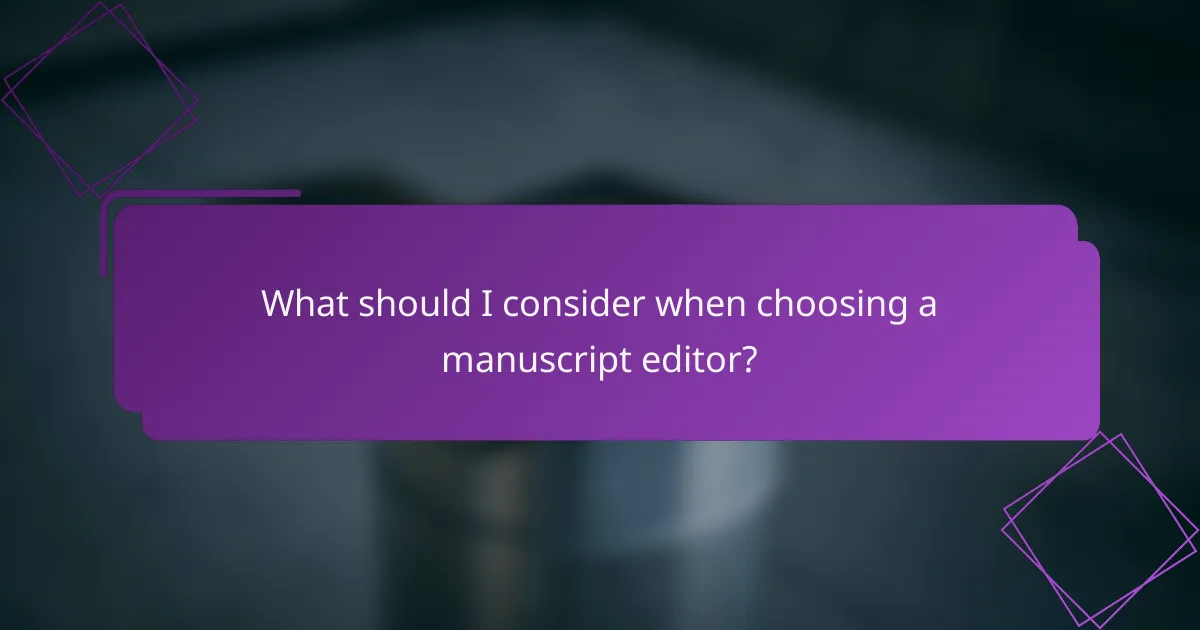
What should I consider when choosing a manuscript editor?
When selecting a manuscript editor, consider their specialization, experience, and client feedback. These factors will help ensure that the editor is well-suited to your specific genre and can effectively enhance your work.
Editor’s specialization in genre
Choosing an editor who specializes in your manuscript’s genre is crucial for effective editing. Different genres have unique conventions, styles, and audience expectations. For instance, a fiction editor may focus on character development and pacing, while a technical editor will prioritize clarity and accuracy of information.
Look for editors who have a proven track record in your specific genre, whether it’s romance, science fiction, or academic writing. This specialization can significantly impact the quality of feedback and revisions you receive.
Experience and qualifications
Experience and qualifications are key indicators of an editor’s capability. An editor with several years in the industry or those who have worked with reputable publishing houses often bring valuable insights and skills. Check their educational background and any certifications related to editing or writing.
Consider asking potential editors about their previous projects and the types of manuscripts they have worked on. This will give you a better understanding of their expertise and whether they align with your needs.
Client testimonials and reviews
Client testimonials and reviews provide insight into an editor’s reliability and effectiveness. Look for feedback on platforms like LinkedIn or specialized editing services websites. Positive reviews often highlight an editor’s communication skills, turnaround time, and the quality of edits.
When evaluating testimonials, pay attention to comments that mention specific strengths or weaknesses. This can help you gauge whether the editor will meet your expectations and contribute positively to your manuscript’s development.
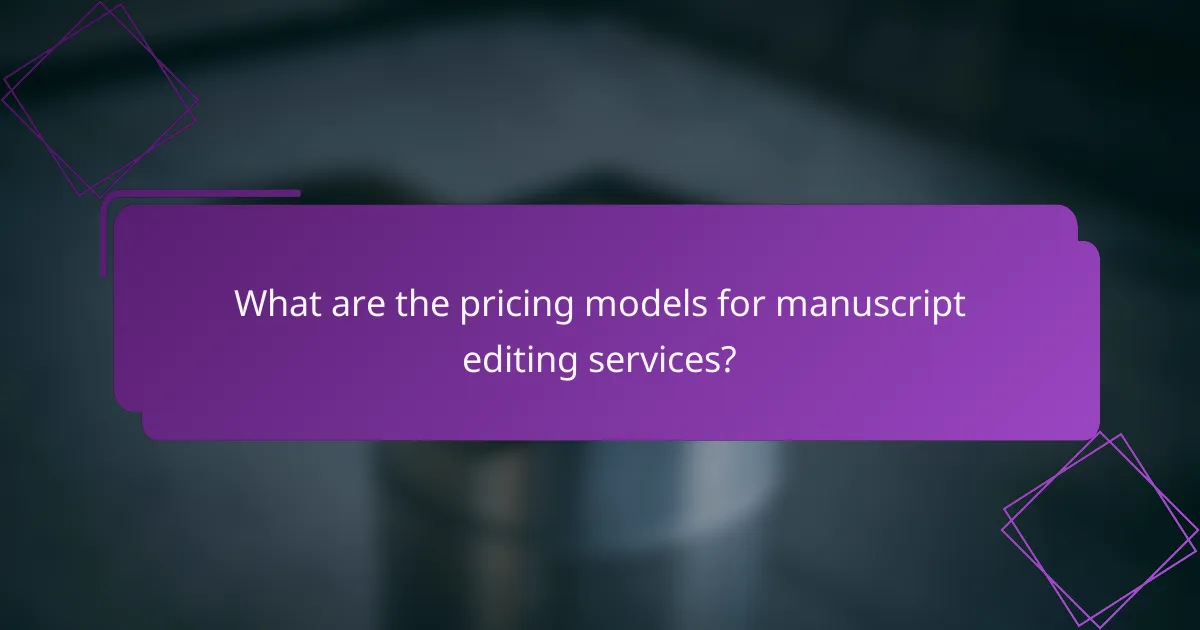
What are the pricing models for manuscript editing services?
Manuscript editing services typically utilize several pricing models, including per-word pricing, flat-rate packages, and hourly rates. Each model has its own advantages and considerations, depending on the complexity of the manuscript and the level of editing required.
Per-word pricing structure
The per-word pricing structure is a common model where editors charge based on the total word count of the manuscript. Rates can vary widely, often ranging from $0.01 to $0.05 per word, depending on the editor’s expertise and the type of editing required.
This model is particularly beneficial for authors with shorter works, as it allows for clear budgeting based on the manuscript’s length. However, it’s essential to consider that additional costs may arise for specialized editing or extensive revisions.
Flat-rate packages
Flat-rate packages offer a set price for specific editing services, regardless of word count. These packages often include a defined scope of work, such as proofreading, copy editing, or developmental editing, and can range from $100 to several thousand dollars based on the service level.
Choosing a flat-rate package can simplify budgeting and provide clarity on what services are included. However, authors should ensure that the package aligns with their specific editing needs to avoid unexpected costs for additional services.
Hourly rates for complex edits
Hourly rates are often used for more complex editing tasks, such as substantial rewrites or specialized content. Rates typically range from $30 to $150 per hour, depending on the editor’s experience and the intricacy of the work.
This model allows for flexibility in addressing specific issues within the manuscript but can lead to unpredictable costs if the editing process takes longer than anticipated. Authors should discuss estimated hours upfront to manage expectations and budget effectively.
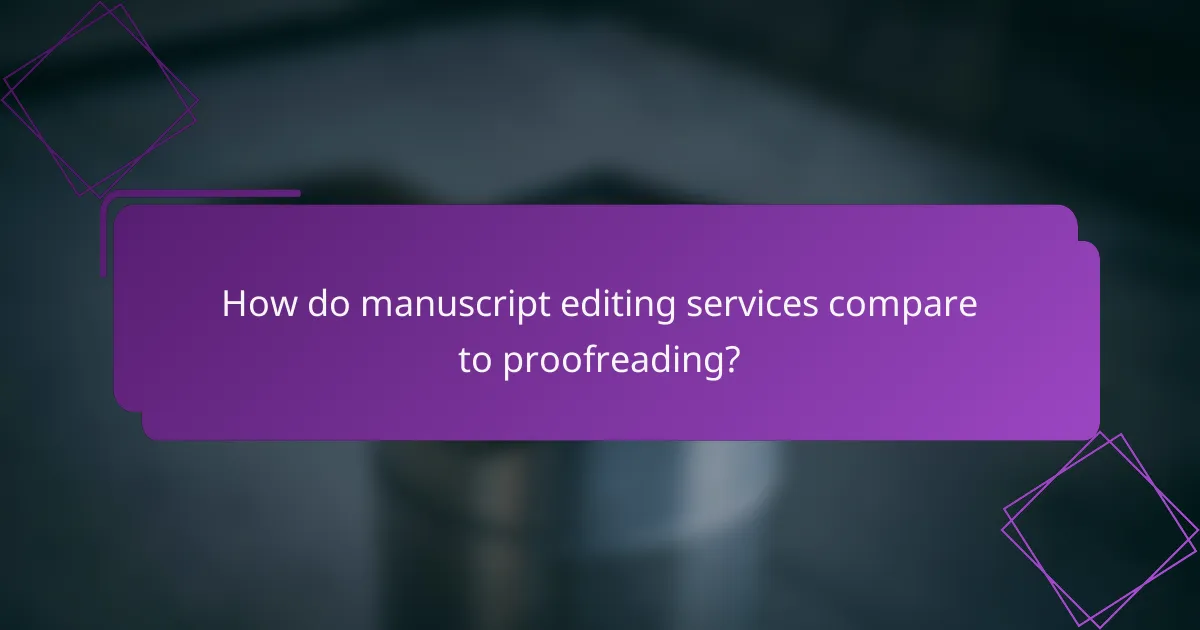
How do manuscript editing services compare to proofreading?
Manuscript editing services focus on enhancing the overall quality of a document, while proofreading is primarily concerned with correcting surface-level errors. Editing involves revising content for clarity, coherence, and structure, whereas proofreading ensures that grammar, punctuation, and spelling are accurate.
Editing focuses on content and structure
Editing is a comprehensive process that examines the manuscript’s content, organization, and flow. Editors assess the clarity of arguments, the effectiveness of the narrative, and the overall structure to ensure that the manuscript meets its intended purpose. For example, an editor may suggest reordering sections or enhancing transitions to improve readability.
During editing, feedback may include suggestions for expanding on ideas, cutting unnecessary sections, or refining the tone to better suit the target audience. This level of engagement can significantly elevate the manuscript’s quality, making it more compelling and engaging for readers.
Proofreading targets surface errors
Proofreading is the final step in the writing process, focused on identifying and correcting typographical, grammatical, and punctuation errors. Proofreaders meticulously review the text to catch mistakes that could distract readers or undermine the author’s credibility. Common issues addressed during proofreading include misspellings, incorrect verb tenses, and misplaced commas.
While proofreading is essential for polished writing, it does not involve making changes to the content or structure. This means that even a well-proofread document can still benefit from editing to enhance its overall effectiveness.
Different levels of service offered
Manuscript editing services typically offer various levels of assistance, ranging from light editing to comprehensive developmental editing. Light editing may involve basic corrections and suggestions, while developmental editing includes in-depth analysis and restructuring of the manuscript.
When choosing a service, consider the specific needs of your manuscript. For instance, a fiction writer may require more extensive developmental editing to strengthen character arcs, while an academic author might need focused editing on argument clarity and citation accuracy. Understanding these differences can help you select the right level of service for your project.

